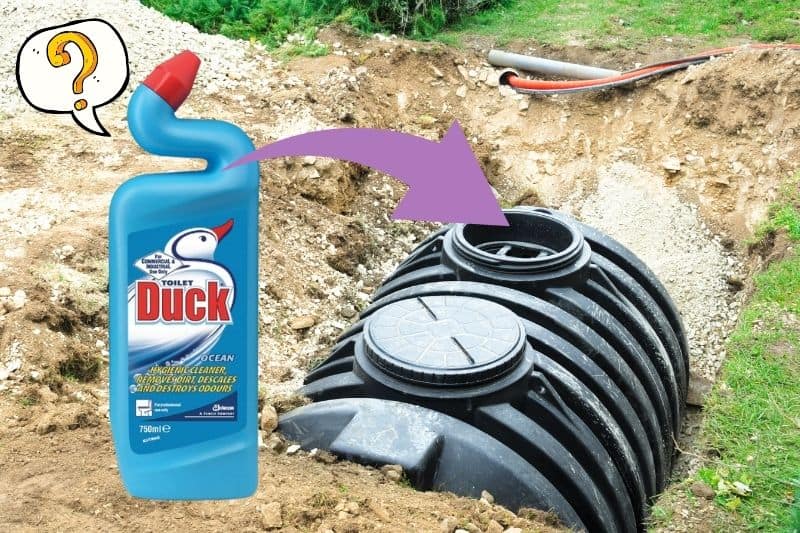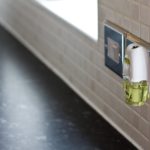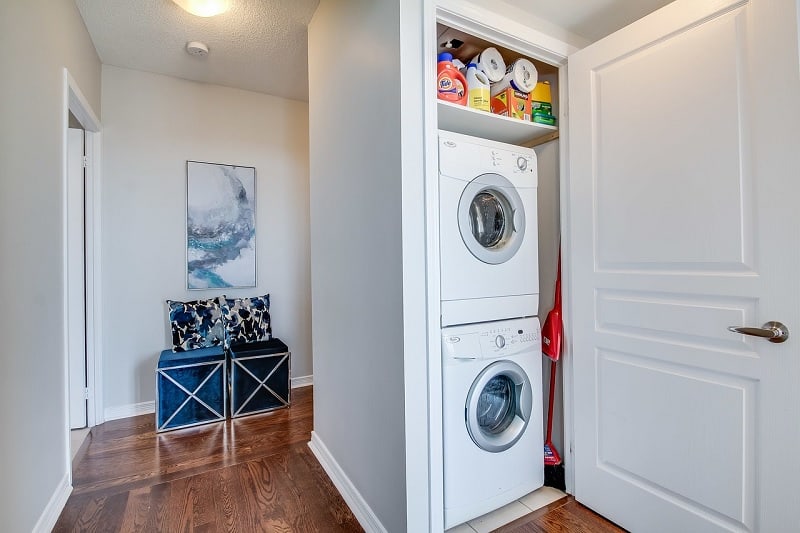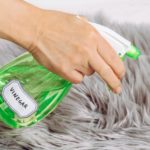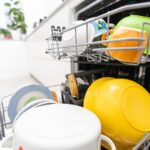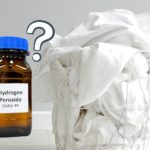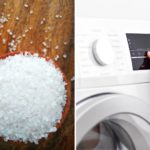If you’ve recently moved into a new house that has a septic tank, you might be wondering how on earth you are meant to clean your toilets in a safe way, without polluting the water in the septic tank or causing harm to the ground.
Septic tanks do work somewhat differently from regular drainage systems, so you may be a tad confused about what should and shouldn’t go down the drain!
After all, you don’t want to pay out for a new septic tank anytime soon because you’ve used the wrong goodies!
So, can you keep on using your faithful Toilet Duck cleaner to clean your lavatories, and more importantly is it safe to do?
The simple answer is: Yes, Toilet Duck is safe for septic tanks, so long as you don’t go overboard with it.
Now you know that it’s okay to use this product, you need to know what other products are fine and not so good to use when you use a septic tank!
Products That Can Be Used with a Septic Tank
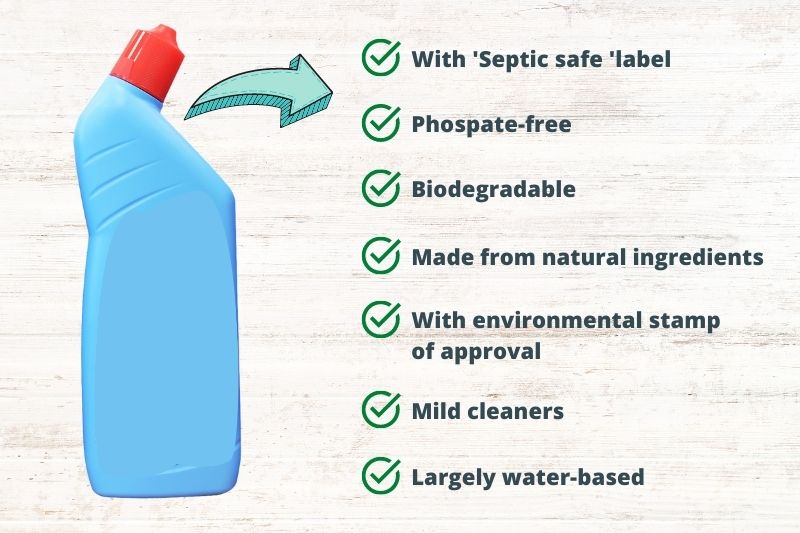
There are so many cleaning products on the market today, and it’s because of this reason that people often have trouble distinguishing between what’s good and bad for their tanks!
So, here’s what you need to look out for when you’re out buying cleaning goods:
- Try and find products that have ‘Septic safe’ written on the packaging. This little marker is given to items that are fine to be used in septic tanks.
- You want to buy goodies that are phosphate-free. Phosphate actually promotes the growth of algae and this is something you really want to avoid happening in your tank.
- You need to choose products that are not going to damage/change the ‘good bacteria’ in your septic tank.
- You must also aim to buy items that are biodegradable. This means that the item can be broken down over a period of time.
- It’s worth buying goods that are made from natural ingredients as these products will cause the least amount of harm to the ground.
- You should also check the packaging for third-party environmental stamps of approval too. Some products come with markers of approval to say that they’ve been tested and are fine to use in a septic tank.
- Always choose mild cleaners wherever possible. These items will contain less harsh chemicals and will not cause as much damage to the tank itself.
- Picking goods that are largely water-based also helps septic tanks.
Cleaning products worth considering
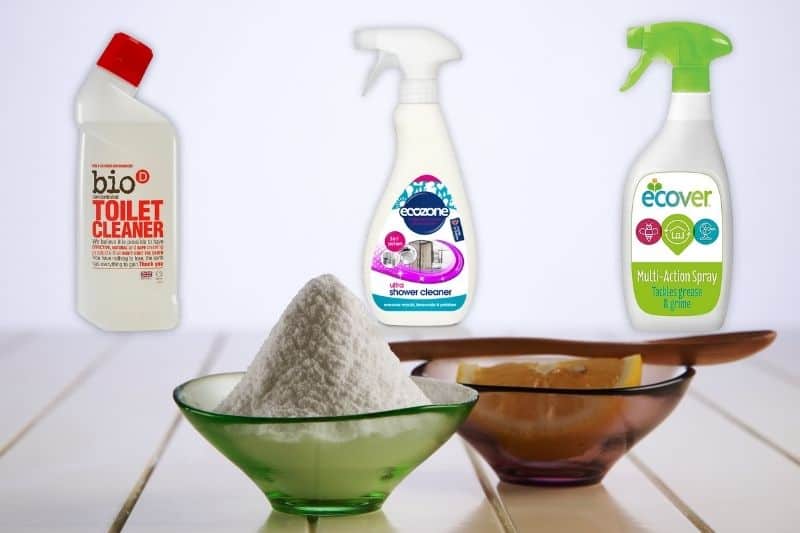
Here are some examples of brands/products that are safe to use if you have a septic tank:
- Ecover
- Ecozone
- Bio D
- Bicarbonate of soda
- White vinegar
- Lemon juice
- Salt
- Ammonia-based products are okay to use, but you should use these items sparingly
- Liquid drainers can be used but not very often
It’s worth pointing out that if you fancy giving your home a thorough clean, but you’re weary about what products you should be using, you could make up some lotions and potions at home to clean with.
Generally, mixtures made up at home contain ‘everyday’ products that are found in our cupboards, so they are typically safer for septic tanks.
Home remedies are usually a lot cheaper to try out than bought-in goods, and you know exactly what products you’ve used as well, so you’ll know if you’re putting your tank at risk or not.
White distilled vinegar, for example, is great because it’s non-toxic and natural. Not all shelf-bought goods are as neutral as this item.
Avoid Using These Types of Products in Your Septic Tank
Septic tank systems are designed to take wastewater from a home and then distribute this water into a ‘drain field’. The water, as you might have guessed, needs to be quite safe and as ‘neutral’ as possible before it gets to the field, otherwise it will pollute the ground.
One way of making sure that the effluent water that leaves the tank is safe is to make sure you don’t put the following products into the septic tank in the first place:
1. Bleach
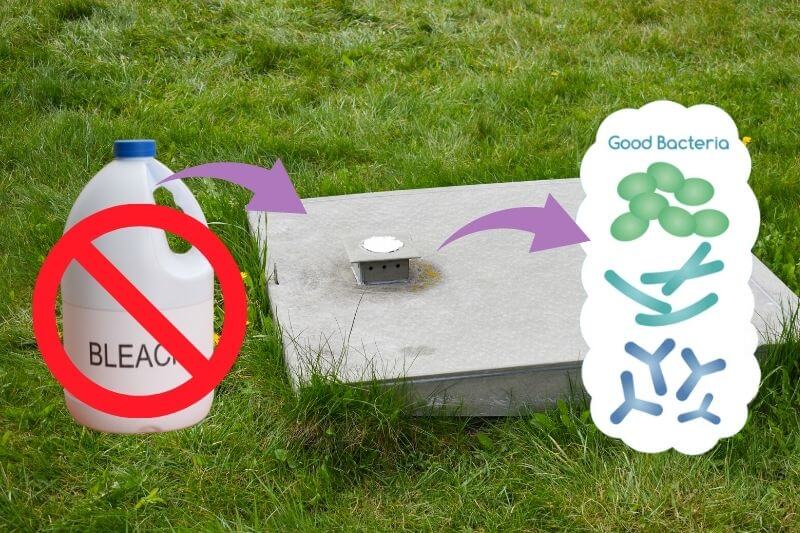
Bleach is one of the biggest items that you need to avoid if you have a septic tank. You should stop putting extra strong and straight bleach into your loos and sinks, in particular!
Why?
Bleach is a product that wants to get rid of all kinds of bacteria, which is exactly what it should do. However, there are certain types of bacteria in a septic tank that are actually ‘good’ and they need to stay there.
So, if you put bleach into your septic tank, you’ll inevitably eradicate the nice bacteria that are needed, and you might end up damaging the tank too.
If you do feel the need to use bleach, you should dilute a very weak bleach in water before using it in your home. And you should avoid doing this too often.
2. Harsh chemicals
Harsh chemicals are also a big no-no for septic tanks.
While you might think that using harsh chemicals is key for taking out tough dirt found in your home, you’re actually polluting the water in the septic tank when the dirty chemical-filled water drains away. And this, in turn, pollutes the drain field.
Groundwater pollution is the name given to this kind of problem and it has a massive impact on those living in the area.
Habitats, usually the homes of various little animals, get destroyed because of this issue and the problem can take years to cure.
3. Solid or foam drain unblockers
Solid or foam drain unblockers should be avoided because they can ruin the inner workings of your septic tank.

Bethan has a passion for exploring, reading, cooking and gardening! When she’s not creating culinary delights for her family, she’s concocting potions to keep her house clean!
